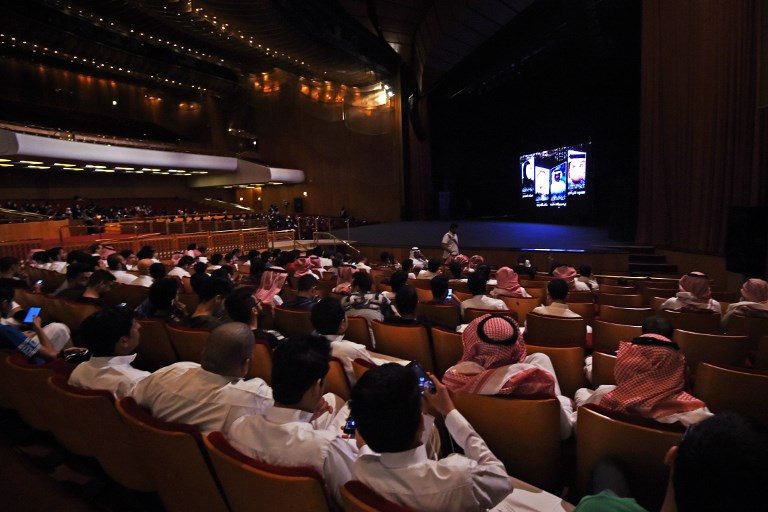SUMMARY
This is AI generated summarization, which may have errors. For context, always refer to the full article.

RIYADH, Saudi Arabia – Saudi Arabia on Monday, December 11, lifted a decades-old ban on cinemas, part of powerful Crown Prince Mohammed bin Salman’s far-reaching liberalization drive that is shaking up the ultra-conservative Muslim kingdom.
The government said it would begin licensing cinemas immediately and the first movie theaters are expected to open next March, in a decision that could boost the Gulf state’s nascent film industry.
Reviving cinemas represents a paradigm shift in the kingdom, which is seeking to balance unpopular subsidy cuts in an era of low oil prices with more entertainment options, despite opposition from hardliners who vilify movie theaters as vulgar and sinful.
“Commercial cinemas will be allowed to operate in the Kingdom as of early 2018, for the first time in more than 35 years,” the culture and information ministry said in a statement.
“This marks a watershed moment in the development of the cultural economy in the kingdom,” the statement quoted Information Minister Awwad Alawwad as saying.
Saudi Arabia is expected to have more than 300 cinemas – with over 2,000 screens – by 2030, giving rise to an industry that would contribute $24 billion to the economy, the ministry said.
Like most public spaces in the kingdom, cinema halls are expected to be segregated by gender or have a separate section for families.
‘Beautiful day’
Hardliners, who see cinemas as a threat to cultural and religious identity, were instrumental in shutting them down in the 1980s.
Saudi Arabia’s highest-ranking cleric warned in January of the “depravity” of cinemas, saying they would corrupt morals.
But authorities appear to be shrugging off the threat, with some comparing Saudi Arabia’s reform drive to a fast-moving bus – either people get on board or risk being left behind.
Saudis themselves appear quietly astounded by the torrid pace of social change, which includes the historic decision allowing women to drive from next June.
Saudi Arabia in recent months has organized concerts, comedy shows, a Comic-Con pop culture festival and a mixed-gender national day celebration that saw people dancing in the streets to thumping electronic music for the first time.
The social transformation chimes with Prince Mohammed’s recent pledge to return Saudi Arabia to an “open, moderate Islam” and destroy extremist ideologies.
Saudi filmmakers have long argued that a ban on cinemas does not make sense in the age of YouTube.
Saudi films have been making waves abroad, using the internet to circumvent distribution channels and sometimes the stern gaze of state censors.
“It is a beautiful day in #SaudiArabia!” Saudi female director Haifaa al-Mansour said on Twitter, reacting to Monday’s announcement.
Her film “Wadjda” made history in 2013 after it became Saudi Arabia’s first Academy Award entry.
The film depicts the dream of a 10-year-old girl to get a bicycle just like the boys in her conservative neighborhood.
‘Catalyst for economic growth’
The lifting of the ban represents a huge opportunity for regional movie chains that have long eyed Saudi Arabia as the Middle East’s last untapped mass market.
Dubai-based Majid Al Futtaim, which owns the VOX Cinemas chain, said it was looking to launch movie theaters in the kingdom.
“These are exciting times and (we) will work with the kingdom to extend the footprint of our VOX Cinemas brand to Saudi Arabia in the months ahead,” Majid Al Futtaim said in a statement.
Without cinemas, filmmakers said investment in films was unlikely to flourish and the depiction of society would not move beyond the foreign portrayal of Saudis as extremist or culturally primitive.
“Now our young men and women will show the world possibilities and stories worth seeing,” Saudi filmmaker Aymen Tarek Jamal said on Twitter.
“Congratulations to the 2030 Generation.”
The reform stems partly from an economic motive to boost domestic spending on entertainment as the kingdom reels from a protracted slump in oil prices.
Saudis splurge billions of dollars annually to see movie shows and visit amusement parks in neighboring tourist hubs like Dubai.
“Opening cinemas will act as a catalyst for economic growth and diversification,” Alawwad said.
“By developing the broader cultural sector we will create new employment and training opportunities,” the information minister said, adding the cinema industry was expected to generate 30,000 permanent jobs by 2030. – Rappler.com
Add a comment
How does this make you feel?
There are no comments yet. Add your comment to start the conversation.